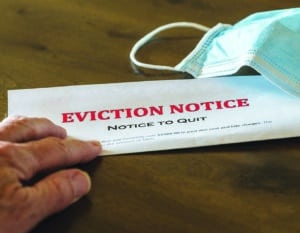A Housing Court judge has struck down Boston’s three-month-old eviction moratorium.
Then-Mayor Kim Janey and the city Public Health Commission introduced the freeze Aug. 31 after the U.S. Supreme Court nullified a nationwide moratorium set out by the Centers for Disease Control. The order also came a day after City Councilor Andrea Campbell, Janey’s competitor in the Sept. 14 mayoral primary, lambasted the acting mayor for not doing enough to protect renters from eviction.
The order banned landlords and property owners from serving or having someone else serve eviction notices and from enforcing residential evictions. The order did not apply to cases where a court has found that a tenant’s presence in a unit has created “serious violations of the terms of the tenancy that impair the health and safety of other building residents or immediately adjacent neighbors.”
The moratorium was necessary, the commission said, to prevent the spread of COVID-19, citing the increased risk of contracting the virus among homeless individuals.
Janet Avila, an elderly Mattapan landlord unable to evict a tenant who lost their eviction case in late 2019, and David Boudreau Sr., a constable whose job it is to carry out evictions, sued the city over the eviction moratorium.
The moratorium actually winds up hurting renters, said Mitchell Matorin, an attorney for Avila and Boudreau along with Jordana Roubicek Greenman, by pushing the smallest landlords – who often rent at below-market rates – to sell their property when they can’t evict a non-paying tenant or when they face serious delays in getting state rental aid.
“They can’t take it any more so what are they going to do? They’re going to sell. It’s a very hot market and rent is very high,” Matorin said. “So grandma, who’s owned the building for 35 years who hasn’t raised the rent to market every year, is going to sell it to an investor who then has a mortgage and who has to make money, so they are going to jack the rent up.”
In the face of state, federal and local moratoriums, Matorin said, some landlords have been holding apartments back from the market to avoid risking landing a non-paying tenant.
While other landlord lawsuits against eviction moratoriums have focused on landlords’ ability to access legal remedies through the courts, at the heart of this case was a question of constitutionality: Could the Boston Public Health Commission issue a regulation that overrode the state legislature, specifically laws passed by the legislature governing the enforcement of a judge’s eviction decision?
The plaintiffs argued that doing so would be a violation of state “home rule” law, which grants all cities and towns their powers, while the commission argued the order was legal under powers the legislature granted when creating it as an entity separate from the city of Boston. These powers give health commissions broad latitude to act during emergencies.
Housing Court Judge Irene Bagdoian, however, sided with the plaintiffs, writing in her decision Monday that despite the broad wording of statutes setting out the Boston Public Health Commission’s powers, the laws do not give the commission power to unilaterally override other laws made by the legislature. Its eviction moratorium does just that, Bagdoian said.
“This Court perceives great mischief in allowing a municipality or one of its agencies to exceed its power, even for compelling reasons,” she wrote. “[S]uch expansion of power by a governmental agency, even for compelling reasons, should be unthinkable in a democratic system of governance.”
The same logic the Boston Public Health Commission used could also be deployed by a wealthy suburb to opt out of affordable housing statutes like Chapter 40B, Bagdoian said.
The case puts the future of tenant protections squarely in the state legislature’s lap, she said, raising the question of whether similar moratoriums in Somerville and Malden will also be enforceable and raising the pressure on legislators to respond to evictions that renter advocates link to income lost during the pandemic.
“The idea you can willy-nilly impose restrictions on property owners doesn’t look at the knock-on effects,” Matorin said. “What this case does is that it says ‘You want to help tenants? Fine. But you have to do it in a way that’s a) legal and b) reflects some thought process beyond the immediate decision.”
In a written statement provided to Banker & Tradesman, Boston Mayor Michelle Wu said her office is examining its next steps.
“I’m deeply concerned about the impacts of today’s decision on struggling families. Our law department is reviewing the decision closely and will seek a stay of the decision to keep the eviction moratorium in place,” Wu said. “We need more protections for renters in Boston. Our focus remains on protecting tenants from displacement during the COVID emergency, and connecting our residents to City and State rental relief programs.”







